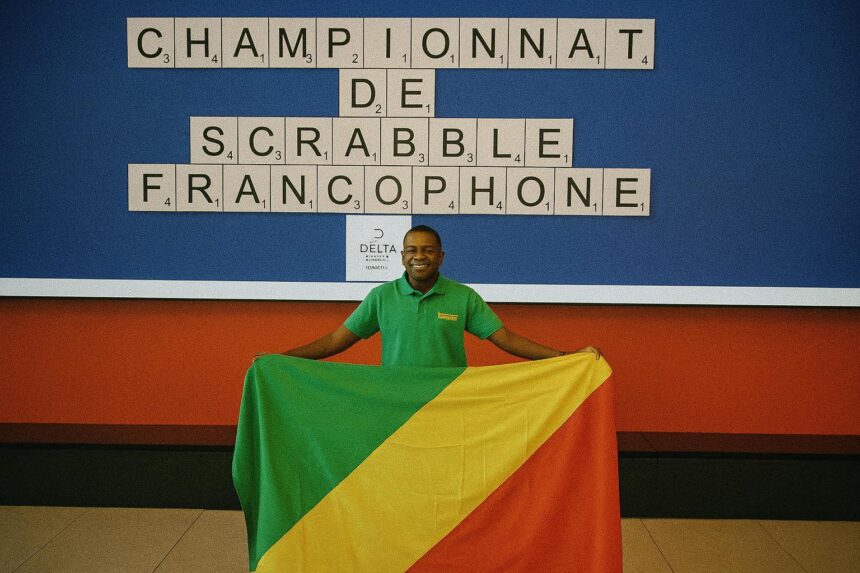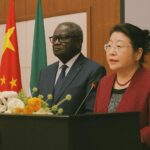Emergence of a Francophone Prodigy
The parquet floor of Trois-Rivières’ convention centre still echoed with polite applause when the final scoreboard of the Fifty-Third Francophone Scrabble World Cup froze at minus twenty-eight. The figure alone did not tell the whole story; it merely confirmed that a seventeen-year-old Congolese student, Briny Oscar Kouba Matouridi, had just equalled the highest mark of the Tournament Homologué 3, outclassing two hundred and eighty-five experienced players drawn from over two dozen nations. Observers from the Fédération internationale de Scrabble francophone nodded in quiet disbelief, noting that never before had such youthful poise been translated so effortlessly into gold at this level (FISF, 2024).
Kouba’s ascent carries symbolic weight that transcends the tiles on his rack. It suggests the maturation of a new generation of francophone intellectual athletes from sub-Saharan Africa, nurtured by the digital availability of lexical databases and by the lively local clubs dotting Brazzaville’s riverbanks. In a country where the median age hovers below twenty, his win becomes a narrative of national possibility as much as individual prowess.
Strategic Acumen Behind the Gold
Scrabble duplicate, the chosen format of the TH3, strips competition of chance by forcing every participant to play the same rack on the same board. Success therefore emerges from a ruthless algebra of probability, linguistic depth and psychological stamina. Kouba’s celebrated ninety-nine-percent success rate over the thirteen rounds testified to a disciplined regimen that reportedly blended mnemonic study of the Official Francophone Scrabble Dictionary with timed end-game simulations carried out under the mentorship of local coach Théophile Obili (Agence d’Information d’Afrique Centrale, 2024).
Those close to the teenager speak of nightly study sessions in which he dissected orthographic curiosities indigenous to Central Africa, realising—perhaps earlier than many adult competitors—that cultural specificity can be weaponised at the game’s highest stratum. By anchoring short but high-yield words derived from Kikongo and Lingala loan forms, he repeatedly secured premium squares that tilted the cumulative margin in his favour.
A Catalyst for Educational Ambitions
The Ministry of Primary and Secondary Education was prompt to congratulate the young laureate, describing the triumph as “a living demonstration of the cognitive dividends available through rigorous language acquisition.” While such official statements often remain ceremonial, they may foreshadow tangible investments. Early indications suggest a forthcoming partnership between the national Scrabble federation and public schools in Pointe-Noire aimed at integrating board analysis into literacy curricula, echoing initiatives in Québec and Wallonia where Scrabble is already leveraged for vocabulary retention.
Educators inside the Congo-Brazzaville Teachers’ Union argue that Kouba’s case strengthens the pedagogical argument for games-based learning at a time when conventional syllabi struggle to compete with mobile entertainment. A televised victory tour, if realised, would permit rural pupils—many of whom share the champion’s socio-economic background—to re-imagine academic excellence through an accessible, low-cost medium.
Implications for Congo-Brazzaville’s Soft Power
International sporting success, even in cerebral disciplines, has long served as a conduit for nations seeking non-coercive influence. In Kouba’s case, the encore of the Congolese national anthem in Québec offered an aural reminder that intangible assets can travel farther than pipelines or trade corridors. The Ministry of Foreign Affairs, already developing a cultural diplomacy roadmap aligned with the African Union’s Agenda 2063, now finds itself in possession of a fresh narrative: Congo-Brazzaville as a cradle of high-order linguistic talent.
Senior diplomats contacted in Addis Ababa note that such victories resonate within multilateral forums where states routinely vie for committee seats. A reputation for intellectual competitiveness can lubricate negotiations in education, science and technology clusters, complementing the country’s established credentials in forestry management and hydrocarbon mediation. Thus, a triple-word score achieved on a Canadian board subtly fortifies Brazzaville’s position at forthcoming UNESCO language heritage deliberations.
Continental Ripple Effects and Future Outlook
Elsewhere on the continent, francophone federations—from Dakar to Yaoundé—have cited Kouba’s feat as evidence that African tournaments, historically sidelined by budgetary constraints, merit greater inclusion in the global calendar. Sponsors attentive to pan-African branding have begun exploratory talks with the International Francophone Games Committee to underwrite a rotational Grand Prix circuit, potentially positioning Brazzaville as an inaugural host city. Such momentum could catalyse south-south exchanges in educational technology and sports governance.
As for the prodigy himself, Kouba maintains that graduation from lycée remains his immediate priority, even as whispers circulate of academic scholarships in Europe and North America. Whether or not he accepts these overtures, his gold medal has already become a durable symbol of what focused youth engagement can yield. Congo-Brazzaville, for its part, stands poised to convert a teenager’s lexical dexterity into a durable instrument of prestige, proof that soft power can sometimes be measured one letter at a time.



















